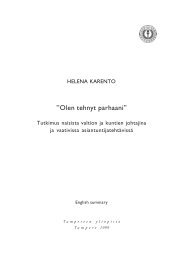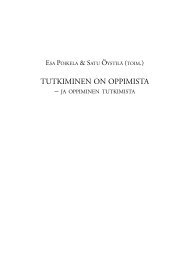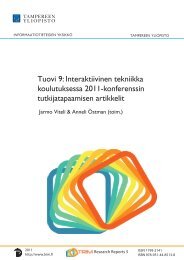Note on this edition: this is an electronic version of the 1999 book ...
Note on this edition: this is an electronic version of the 1999 book ...
Note on this edition: this is an electronic version of the 1999 book ...
Create successful ePaper yourself
Turn your PDF publications into a flip-book with our unique Google optimized e-Paper software.
84Dem<strong>on</strong>ic Texts <strong>an</strong>d Textual Dem<strong>on</strong>sd<strong>is</strong>course <strong>is</strong> establ<strong>is</strong>hed in Descartes’s Meditati<strong>on</strong>s through <strong>an</strong> exerc<strong>is</strong>e <strong>of</strong>thought against <strong>an</strong> imaginary, deceptive “evil spirit” (genium malignum) –<strong>the</strong> possibility for bodily or “irrati<strong>on</strong>al” elements in <strong>the</strong> foundati<strong>on</strong> <strong>of</strong> selfhoodare rejected. As Descartes summar<strong>is</strong>es h<strong>is</strong> thought in <strong>the</strong> D<strong>is</strong>course <strong>on</strong>Method:I <strong>the</strong>reby c<strong>on</strong>cluded that I was a subst<strong>an</strong>ce, <strong>of</strong> which <strong>the</strong> whole essence ornature c<strong>on</strong>s<strong>is</strong>ts in thinking, <strong>an</strong>d which, in order to ex<strong>is</strong>t, needs no place<strong>an</strong>d depends <strong>on</strong> no material thing; so that <strong>th<strong>is</strong></strong> ‘I’, that <strong>is</strong> to say, <strong>the</strong> mind,by which I am what I am, <strong>is</strong> entirely d<strong>is</strong>tinct from <strong>the</strong> body, <strong>an</strong>d even thatit <strong>is</strong> easier to know th<strong>an</strong> <strong>the</strong> body, <strong>an</strong>d moreover, that even if <strong>the</strong> bodywere not, it would not cease to be all that it <strong>is</strong>. 14Foucault interpreted <strong>the</strong> author as a functi<strong>on</strong> <strong>of</strong> literary d<strong>is</strong>course – <strong>an</strong>“author-functi<strong>on</strong>” – <strong>an</strong>d, similarly, he reads philosophical d<strong>is</strong>course as atechnique that produces a certain kind <strong>of</strong> subject. He points out that Descartes’stitle <strong>is</strong> “Meditati<strong>on</strong>s,” <strong>an</strong>d <strong>th<strong>is</strong></strong> me<strong>an</strong>s not just a simple dem<strong>on</strong>strati<strong>on</strong><strong>of</strong> <strong>an</strong> argument. Meditati<strong>on</strong> aims at modifying <strong>the</strong> enunciating subject;typically a meditati<strong>on</strong> <strong>is</strong> a spiritual exerc<strong>is</strong>e that alters <strong>the</strong> state <strong>of</strong> subjectfrom darkness to light, from impurity to purity, from <strong>the</strong> clutches <strong>of</strong> passi<strong>on</strong>sto detachment, <strong>an</strong>d from uncertainty to w<strong>is</strong>dom <strong>an</strong>d tr<strong>an</strong>quillity. “Inmeditati<strong>on</strong>, <strong>the</strong> subject <strong>is</strong> ceaselessly altered by h<strong>is</strong> own movement; h<strong>is</strong> d<strong>is</strong>courseprovokes effects within which he <strong>is</strong> caught; it exposes him to r<strong>is</strong>ks,makes him pass through trials or temptati<strong>on</strong>s, produces states in him, <strong>an</strong>dc<strong>on</strong>fers <strong>on</strong> him a status <strong>of</strong> qualificati<strong>on</strong> which he did not hold at <strong>the</strong> initialmoment.” 15 Text, in o<strong>the</strong>r words, may have a dimensi<strong>on</strong> as a “technique <strong>of</strong><strong>the</strong> self”: it c<strong>an</strong> produce effects <strong>on</strong> <strong>the</strong> subject, <strong>an</strong>d reading should pay carefulattenti<strong>on</strong> to such “subject-effects” – ways in which <strong>the</strong> state <strong>of</strong> subject <strong>is</strong>c<strong>on</strong>structed <strong>an</strong>d mediated to <strong>the</strong> reader.Dem<strong>on</strong>ic possessi<strong>on</strong> <strong>is</strong> perhaps <strong>the</strong> most traditi<strong>on</strong>al way <strong>of</strong> explainingmadness; <strong>the</strong> c<strong>on</strong>fused <strong>an</strong>d der<strong>an</strong>ged state <strong>of</strong> madness <strong>is</strong> made comprehensible<strong>an</strong>d accessible by reference to dem<strong>on</strong>s. It <strong>is</strong> interesting to note how Foucault<strong>an</strong>d Derrida relate to <strong>the</strong> “evil spirit” <strong>an</strong>d madness in Descartes’s d<strong>is</strong>course.Their readings present us with two different views <strong>of</strong> textuality <strong>an</strong>d<strong>the</strong> dem<strong>on</strong>ic. The debate <strong>on</strong> “madness” <strong>an</strong>d “dem<strong>on</strong>” marks <strong>the</strong> place “bey<strong>on</strong>dl<strong>an</strong>guage” <strong>an</strong>d <strong>the</strong> relati<strong>on</strong> <strong>of</strong> <strong>the</strong>ory to <strong>th<strong>is</strong></strong> area. In <strong>an</strong> interview in <strong>the</strong>1980s, when questi<strong>on</strong>ed about h<strong>is</strong> relati<strong>on</strong> to h<strong>is</strong> Jew<strong>is</strong>h heritage, to philosophy<strong>an</strong>d ethics, Derrida emphas<strong>is</strong>ed that “[d]ec<strong>on</strong>structi<strong>on</strong> <strong>is</strong> always deeplyc<strong>on</strong>cerned with <strong>the</strong> ‘o<strong>the</strong>r’ <strong>of</strong> l<strong>an</strong>guage.” 16 The m<strong>an</strong>ner <strong>of</strong> engaging with <strong>th<strong>is</strong></strong>both positi<strong>on</strong>s, those <strong>of</strong> Foucault <strong>an</strong>d Derrida, are paradoxical, <strong>an</strong>d <strong>the</strong>refore “philosophicallyuntenable,” but that <strong>the</strong>y never<strong>the</strong>less illustrate <strong>the</strong> positi<strong>on</strong> <strong>of</strong> a subject c<strong>on</strong>tradictedby its own l<strong>an</strong>guage, c<strong>on</strong>st<strong>an</strong>tly overstepping itself, passing out into <strong>the</strong> o<strong>the</strong>r.“Perhaps <strong>the</strong> madness <strong>of</strong> philosophy <strong>an</strong>d <strong>the</strong> philosophy <strong>of</strong> madness are, after all, eachbut <strong>the</strong> figure <strong>of</strong> <strong>the</strong> o<strong>the</strong>r?”14Descartes 1637/1985, 54.15 Foucault, “M<strong>on</strong> corps, ce papier, ce feu” (1972; Foucault 1979, 19; 1961/1979, 593).16Derrida 1984, 123.














